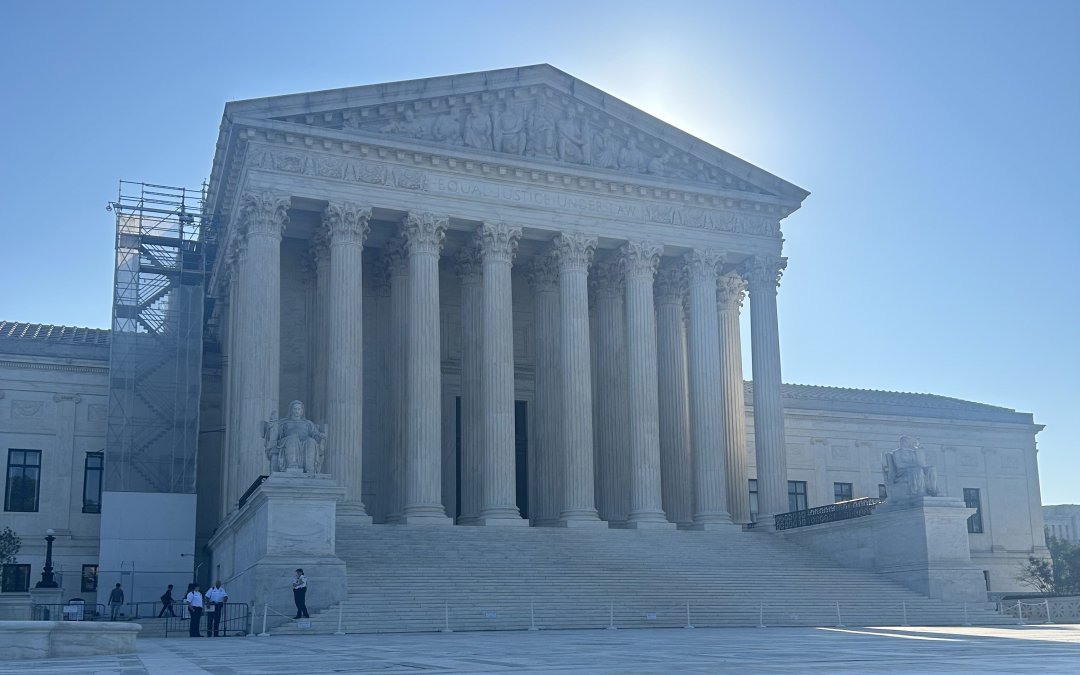WASHINGTON — As former president Donald Trump continues to face legal battles across the country, one case involving his name has reached the Supreme Court. But he was not in the courtroom on Wednesday, nor is he one of the parties involved.
The Supreme Court heard oral arguments for Vidal v. Elster, which concerns whether the U.S. Patent and Trademark Office (USPTO) violated the First Amendment’s freedom of speech provision when it rejected a trademark containing a person’s name without that person’s consent.
The trademark at the center of this case is Steve Elster’s slogan “Trump Too Small.”
Elster’s slogan was inspired by a crude moment that took place on the Republican presidential campaign trail in 2016, when candidate Marco Rubio mocked Trump’s small hands and suggested there was a correlation with the size of his other body parts.
“You know what they say about men with small hands,” Rubio said at his rally in Salem, Va.
Trump later rebutted Rubio’s claim at a debate, saying “I guarantee you there’s no problem.”
According to the brief submitted by Elster’s attorneys, the slogan is also a “double entendre” that highlights the “smallness of Donald Trump’s overall approach to governing.”
Elster began selling T-shirts printed with “Trump Too Small.” When he attempted to register the slogan with the USPTO in 2018, Elster was denied. The USPTO examiner cited Section 2(c) of the Lanham Act, the national trademark law.
Section 2(c) bans federal registration of a trademark that “consists of or comprises a name, portrait, or signature identifying a particular living individual except by his written consent.” Trump did not give consent to Elster, so the USPTO rejected the registration filing. Elster sued, claiming that the USPTO violated his First Amendment right to free speech.
A federal appeals court sided with Elster, saying this case was at “the heart of the First Amendment” because the government cannot obstruct speech critical of a public figure, even involving trademarks.
During Wednesday’s oral arguments, Justice Sonia Sotomayor pushed back on the case’s connection to freedom of speech. The denial of a trademark registration doesn’t prevent Elster or others from using the phrase, Sotomayor said.
“The question is: Is this an infringement on speech? And the answer is no,” Sotomayor said. “He can sell as many shirts (as he wants) with this saying and the government is not telling him he can’t use the phrase, he can’t sell it anywhere he wants. There’s no limitation on him selling it.”
Deputy Solicitor General Malcolm Stewart, who represented the patent office and its director, Katherine Vidal, argued that a government benefit is at stake in this case, not free speech.
Justice Samuel Alito, however, cited the court’s unanimous decision in the 2017 case Matal v. Tam, in which the justices sided with the trademark seeker’s freedom of speech.
In his majority opinion for Tam, Alito said the benefits of federal trademark registration are non-monetary and therefore do not grant the government discretion to pick and choose which trademarks to register. Alito reminded Stewart on Wednesday of his stance.
“I mean, you don’t need my vote to win your case,” Alito said. “I’m trying to see if you have any argument, or that maybe you’ve just decided, ‘Well, Alito’s a lost cause.’”
Chief Justice John Roberts raised the concern that if Elster is granted the trademark registration, he could restrict others from using the slogan, which is seemingly the opposite of freedom of speech.
“Presumably there’ll be a race for people to trademark, you know, ‘Trump Too This,’ ‘Trump Too That,’” Roberts said. “And then, particularly in an area of political expression, that really cuts off a lot of expression other people might regard as an important infringement on their First Amendment rights.”
Justice Amy Coney Barrett pointed out that the provision’s requirement of consent should be considered when discussing the implications of the case. If consent for negative political slogans was always necessary, Barrett said, then Trump could hypothetically register the slogan “Trump Too Small” himself so that none of his critics could use it. This would limit Elster’s freedom of speech, Barrett said.
Stewart, however, argued that this is an unlikely scenario. Trump would have to prove his intent to use the slogan for trade purposes, such as printing the phrase on T-shirts and selling them.
“Unlike with patent and copyright protection, where you can create the thing and just sit on it, it is a core requirement for trademark registration that you have to assert at least the intent to use the mark in commerce,” Stewart said.
Sam Ernst, Golden Gate University School of Law Professor and former intellectual property lawyer, said in an interview that hypothetical scenarios like the one Barrett raised are still possible and shouldn’t be taken lightly. Ernst said this could create a “regime” in which political commentary is solely positive, so long as consent is required. Ernst also submitted an amicus brief in support of Elster.
“Donald Trump owns trademark registrations that identify him for his Trump hotels and other businesses, and those are, of course, all positive,” Ernst said. “And presumably any other politician, whether it would be Trump, Obama, Biden or a famous celebrity would only register and would only consent to marks that are positive.”
Ernst said this will lead to “de facto viewpoint discrimination,” since only positive political commentary will be permitted for trademarks. This type of discrimination was deemed unconstitutional by Tam and Iancu v. Brunetti, another First Amendment case about trademark law.
Ernst said political speech would have more protection if the Supreme Court decides that the section of the trademark law cited violates Elster’s First Amendment rights.
“It would allow for a wider range of marks that make fun of politicians,” Ernst said.
A decision is expected by June 2024.


